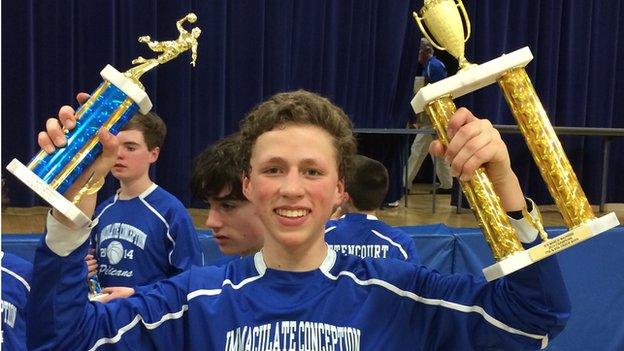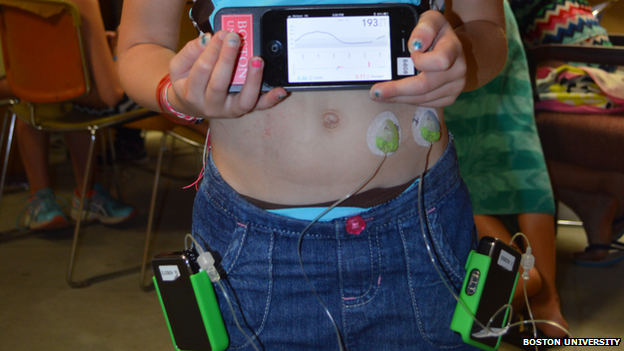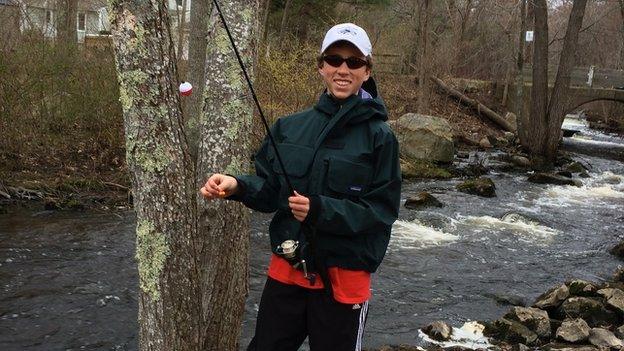Bionic pancreas: A new dawn for diabetics?
- Published

Sports mad diabetic Christopher says the bionic pancreas will allow him to feel like a "normal" teenager
Those with type 1 diabetes often say having the condition is like having a second job such is the stress of monitoring their blood sugar levels and administering doses of insulin.
Now a group of researchers in the US say they have developed the first bionic pancreas that works in the real world enabling patients to lead a near normal life. Lin Lin Ginzberg and Kate Dailey investigate.
Like many teenagers Christopher Herndon loves sports. He is an avid fisherman, swimmer, cross country runner and mountain bike racer. But managing his Type 1 diabetes often limits his ability to follow his passion.
Every time he eats, exercises or gets stressed he has to check his blood sugar levels in order to ensure he has injected the right amount of insulin in his bloodstream. That often means sitting out games or simply not taking part.
This job is usually performed automatically by the body's pancreas but Type 1 diabetics do not produce insulin, the hormone that regulates blood sugar, so they have to inject it
Last summer however, Christopher was one of a small group of people who road tested a 'bionic pancreas' in a real-world trial that has life-changing potential.
The device uses a smart phone, a continuous blood sugar (glucose) monitor and pumps to automatically deliver the correct quantity of hormones directly into the bloodstream.

A young patient shows off the bionic pancreas she is testing out
It mimics a real pancreas by delivering both insulin to lower blood sugar and glucagon to raise it.
Dr Edward Damiano of Boston University, who has helped develop the device, external, says: "When you're physically active, suddenly your glucose levels can drop dramatically and so what the body does in response to that is to secrete glucagon and our system does the same thing.
Information on blood sugar levels is fed to the smart-phone 'brain' which makes decisions every five minutes and tells the pumps, via Bluetooth, how much insulin and glucagon to deliver.
Although the separate components of the device have been available for some time, this is the first time they have been made to work with an automated system and trialled in a 'real world' environment.

Dr Damiano wants the bionic pancreas to be ready in time for when his diabetic son David goes to university
The new element here is that all the guess work and calculation normally carried out by the patient is handled entirely by the device explains Dr Damiano who has a personal motivation to get the bionic pancreas ready quickly.
His son David has Type 1 diabetes and will have to manage his diabetes care when he goes off to university in just over three years time.
"It's really too much for anyone to bear," Dr Damiano says.
"Young people who start college with type 1 diabetes have such a hard time managing this new world that they're engaging with and at the same time they're taking full responsibility of their diabetes.
"My goal is to build a device that will unburden him of that."
And it is not just Dr Damiano. Labs across the world are racing to develop the most efficient bionic pancreas.
Dr Alasdair Rankin, Diabetes UK , externalDirector of Research, agrees it is an exciting time and the race is nearing its finishing line.
"It's fantastic that research on the artificial pancreas is forging ahead, both in the United States and right here in the UK, external.
"Clearly more work will be needed before these systems can be used independently at home as a routine treatment option, but there is now real hope that this technology has the potential to transform the lives of people with Type 1 diabetes within a generation."
As Kate Dailey reports, trials of the "bionic pancreas" are in their final stages
'Send them home'
Certainly, early signs are that the trial, external represents a critical step forward in taking the bionic pancreas out into the real world.
"We had people walking around Boston with no set schedule, no limitations on what they could eat or when they could eat it," says Dr Steven Russell of Massachusetts General Hospital, who worked on the trial Christopher took part in.
"We give them a bionic pancreas and send them home".
The device might also tackle one of the most dangerous aspects of diabetes, what the professionals call 'dead in the bed syndrome'.
"This is the scenario where somebody with diabetes goes to bed and they are found dead in the morning and the cause of that is low blood sugars that occur at night" says Dr Russell.
Diabetes UK's Dr Rankin says that people with Type 1 diabetes are "over twice as likely to die in any given year as someone of the same age who does not have the condition. That is a tragic reality that the artificial pancreas has the potential to change."
In the trial the bionic pancreas was better at controlling blood sugar than the patients.
"If this system behaves in the big trials the way it's been behaving so far, it will get approved and it will become the new standard of care," Dr Rankin says.
There are limitations to the bionic pancreas however. It runs on batteries which need to be replaced regularly and the pumps filled with glucagon and insulin. It also requires a certain amount of maintenance.
"Of course we hope that there will be a true cure that comes along but this system can keep people safe until that happens. It's the next best thing to a cure." says Dr Russell "I would love to be able to provide this to every one of my patients, and say 'see me in a year'."
'Minute to minute'

Christopher is an avid fisherman
Christopher says it transformed his life for the brief time he used it.
"I used the bionic pancreas last summer at camp. The week that I was on the bionic pancreas I never had to sit out any activities because my blood sugar was low.
"If I had the bionic pancreas, I could do so much more with it and I could feel normal more."